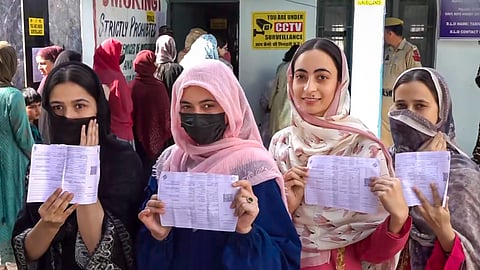

On August 16, when the Chief Election Commissioner announced polls to "take forward the dreams of democracy...for an elected government through (assembly) elections”, a wave of enthusiasm engulfed J&K. The excitement of the J&K ‘awaam’ to exercise their franchise after a decade and for the first time after the abrogation of Article 370 was well reflected in the 61.13% voter turnout during the first phase of the assembly elections on September 18. This earned appreciation from PM Narendra Modi himself who said the people of J&K have "written a new chapter of history".
So, what makes this election different from the previous ones?
1) Peaceful elections: Devoid of bullet sounds, the first phase of the elections saw voters including women, elderly and first-timers fearlessly punching their hopes on the ballots. There were no threats from terrorist organisations or cases of violence. People swarmed to the polling booths even in militancy-affected areas of J&K. The voting percentage in Pulwama turned out to be 46.65% as against 38.31% in 2014. Similarly, Anantnag (57.84%), Kulgam (62.46%), Shopian (55.96%) and other seats too showed a much higher poll percentage than the last assembly elections. Also, with efficient administration and home-voting facility (introduced for the first time in assembly elections in J&K), meticulous preparations to foster inclusivity and seamless process execution were visible.
2) High number of independent candidates: More than 40% of the 908 candidates contesting the assembly elections are independents. 365 candidates have filed their nominations as independent candidates to contest the three-phase polls. This is much greater than the number of independent candidates (274) in the 2014 assembly elections. The Sopore seat has the highest number of independent and total candidates.
3) Aspiring youth: The long-awaited assembly elections has boosted enthusiasm among the youth, their inked fingers a testament. They are hopeful that the upcoming J&K government would strive for the betterment of the people. The key issues spanning the region include the detention of youth, terrorism threat, lack of development and unemployment. Elections are expected to act as a catalyst towards positive reforms in this direction. Gulnaaz Ahmed, a resident of Trikuta Nagar, Jammu, exclaims, “I believe that our votes will be a small step towards change. Hope that the new government will ensure employment opportunities for the people and bring ground-level reforms.”
Though aspirations of youth are high, unemployment remains a major challenge. Lt. Col (retd.) JS Sodhi, a defence and strategic affairs analyst, says, “Efforts on a war footing need to be taken to generate employment in J&K. The private sector will only invest in J&K to generate employment opportunities when peace reigns."
Another concern is the detention of youth. The 2024 annual report by the Forum for Human Rights in Jammu and Kashmir brought out by former judges, bureaucrats and military officers highlights that the use of preventive detention laws remains a significant concern. According to the report, over 2,700 people were booked under the Unlawful Activities (Prevention) Act (UAPA) and Public Safety Act (PSA) between 2020 and 2023.
Given Jammu & Kashmir's strategic location, history and the fact that it has witnessed infiltration of terrorists from across the international border as well as the Line of Control, the elections hold high significance. Sodhi adds, “It has been over 35 years since terrorism started in Jammu and Kashmir in 1989. What the people of J&K need the foremost is peace. A RAND Corporation report, which studied how terrorism ends, shows that 7% ended by using military force, 43% through political dialogue, 40% through effective policing and 10% after the terrorist objectives have been achieved. Military and police action has been going on for the last 35 years in J&K. Now, peace has to be restored in J&K through political dialogues as peace was restored in Punjab as a consequence to the Longowal Accord after 15 years of terrorism.”
The historic election is expected to witness 87.09 lakh voters, with 3.75 lakh voters being first-timers. The second phase of the polls will be held across 26 seats on September 25 and the final phase will see voting in 40 seats on October 1. The Ministry of External Affairs has invited a group of senior diplomats, mainly from the American, European and ASEAN embassies, to visit Kashmir and witness the ongoing election process in the Union territory. With the INDIA bloc (Jammu Kashmir National Conference, Congress, Communist Party of India-Marxist), BJP, PDP and independents having already pitched their manifestos amidst the voters, with the main promise being providing statehood to J&K, it is the voters who would redefine the political landscape of J&K.
Akshita Wadhwa, a student of IIMC, Jammu, considers the assembly elections as a voice for change. She adds, “I, as a voice of J&K, am expecting the upcoming government to take the development process seriously. Issues like delay in welfare benefits, terrorism, maintenance of cleanliness, etc require prime addressal.” The results of the assembly elections will be declared on October 8 -- a beautiful reality of change and not a mirage of promises is expected from the upcoming government. As the song 'Naam Ada Likhna' from Bollywood movie Yahaan, which fills the heart with hope amidst all odds and is set against the backdrop of a tense J&K, goes: 'Wadi ke mausam bhi ek din to badlenge!'